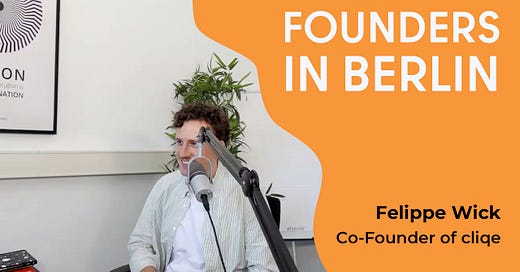Quitting a Steady Job, Solopreneurship, Building for Creator Economy with Felippe Wick from cliqe
Felippe talks about how viable being an indie hacker is, why you should build in public and what risks to take in Berlin. And of course we learn more about cliqe, the creator economy marketplace.
The second episode brings you another bright founder. Meet Felippe! He was born and raised in Berlin, is a native Berliner. He has impressive names in his resume such as TUB, wefox and Trade Republic before starting his solopreneur journey, joining an Antler cohort and currently working on cliqe with his co-founder. During our chat, we shed light on these career transitions, his rationale for them and more.
Here are the highlights we picked from the show. If you feel like listening to the whole episode, go to Spotify or your favorite podcast platform.
How did you start building? 🛠
I started already implementing some ideas after work and on the weekend, some smaller projects initially.
Another idea I had for many years was a platform that enables you to share your calendar with your community. It could be any kind of interest groups around your hobbies or basically your friends. Roughly 14 months ago, I started out building a mobile app called Upto. I built everything and did the marketing by myself.
How did you decide to leave your job? 👋
I was working on it for two or three months in parallel and then I decided I want to do something by myself and for myself.
It's no secret that many first-time founders fail, but then the second or third attempt is oftentimes successful. And with this knowledge, I also went into this journey with an expectation that stuff couldn't work out in the beginning. But you build the muscle for product building, design and marketing. I think if I had to build up to today again, it would maybe cost me half the time and that's already a very valuable outcome.
So, when you were leaving your job, were you thinking that even if you failed, it would still be worth it? 🤔
I'm not super risk averse in general, but coming from Germany and the Berlin ecosystem, having worked in tech before, I didn't see many risks, to be honest. I mean, time has changed a little bit, but in 2021 it was like really an employee market, so recruiters messaged me a lot and I felt like, okay, if this job, if this startup attempt goes wrong, I might find something in a couple of months.
At the end of the day, the ecosystem in Berlin is really nice with all kinds of support frameworks that either give you access to coaching, funding or just like scholarships, like the Berlin Startup scholarship. With these circumstances, I was actually okay to bet on myself.
Can you explain your product cliqe’s business model to me? 📈
cliqe is an influencer marketing platform that focuses on nano and micro influencers.
We saw that those smaller creators don't have such a big reach to be relevant for brands, but they have a higher engagement rate with their audience. They are oftentimes more authentic and their community trust their opinion and recommendations more. So we saw that if they promote a brand or like the product or service, they have higher conversions.
We match smaller content creators with brands for the creator to promote the brand's products and for the brands, we give them access to small content creators that can become authentic ambassadors for their offerings. And every time a smaller creator or the creator promotes a product successfully, they will receive a commission from the company. And since we are sitting in between, we will take a share of the value creation.
There are a lot of people in Berlin trying to create their own startups. What would be a tangible starting point for those people? 🤓
For me, a no-brainer is to to go to the events that are hosted frequently by all the incubators, meetups, etc. Definitely check the events out from all those institutions. You can meet founders, you can talk to them and oftentimes you can already join certain sprints for two weeks. You can iterate on your ideas, come up with ideas and meet people that also want to build something.
This is a great start. And then you can gradually become more invested, maybe apply for a scholarship or take part in a pitch event or a business model competition. All that stuff can also be done next to your studies or after work on the weekend. So I think this would be a smooth start right away.
You can find Felippe on Twitter or LinkedIn and learn more about cliqe on cliqe.de.
Tune in now to catch up with our latest episode or snooze until next week for the highlights.





